- Pharmacy School

Best Pharmacy School Personal Statement Examples
Check out top 4 sample statements.
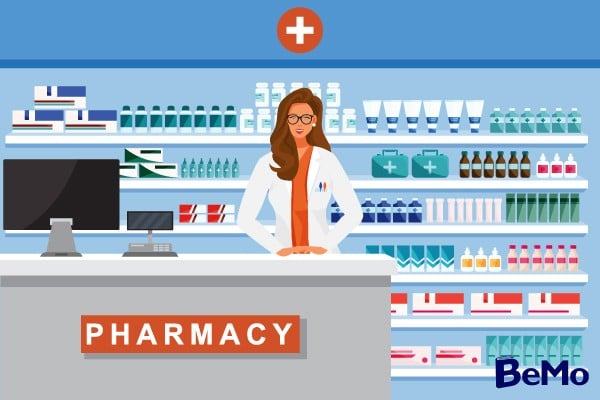
Pharmacy school personal statement examples demonstrate that pharmacy school applications require many different documents to adequately assess you as a potential candidate. In addition to looking at your CV , transcripts, letters of recommendation , and any other required materials, most pharmacy programs ask you to submit a personal statement. After gathering so many materials together, a one-page essay may seem like a trivial item to check off on your application to-do list, but beware of treating the personal statement too lightly! Gaining admission to a graduate pharmacy program certainly requires top grades, competitive test scores, and glowing letters of recommendation from referees who know you well, but these aren’t the only components that admissions committees take into account when evaluating your profile.
Keep in mind that most pharmacy school applicants already have stellar academic records, impressive test scores, and fantastic recommendations. These sorts of accomplishments are important, but are more or less a given in the application process. Furthermore, grades, test scores, and other people’s perceptions of you and the quality of your work are insufficient to determine if you are up for the challenge of the rigors of pharmacy school and the work that follows graduation. With something as serious as pharmacology, it is crucial to determine whether who you are would make you a good fit for the profession. Your knowledge, experiences, and attitudes all play a key role in deciding if you would thrive as a pharmacy student, and eventually, as a pharmacist serving your community. With so many applicants each cycle, admissions officers need some way to gauge these factors in order to narrow the applicant pool down to those they would like to speak to in person, or these days, over the internet. This is where the personal statement comes in! Keep reading to determine what a pharmacy school personal statement measures and how to create one that will make you stand out from other applicants.
>> Want us to help you get accepted? Schedule a free initial consultation here <<
Article Contents 24 min read
4 pharmacy school personal statement examples.
Three days after my thirteenth birthday, my mother was diagnosed with breast cancer. The next twelve months were the toughest in my life, but this experience also gave me something I am forever grateful for—an unwavering passion for pharmacy. I always accompanied my mother to her chemotherapy sessions, where I performed plays for her and the other patients, trying to make them smile. I took an immediate liking to the pharmacist, who returned repeatedly to ask my mother how she was feeling; he explained in detail how these chemo drugs worked and how they interacted with others she had been taking. I listened raptly, entranced by the seemingly magic properties of this medication. It was difficult to watch my mother lose her hair and become frail, but she ultimately made a full recovery, thanks to the wonderful team of medical professionals and to these life-saving drugs. While I lost the naivety of youth that year, I gained a profound new sense of purpose. I was inspired to become a hospital pharmacist and to help patients in times of extreme uncertainty and pain.
Anyone who has ever faced a challenge has probably heard about the deflating nonexistence of a “magic pill” solution. Want to lose weight? There’s no magic pill for that. Trying to learn a new language? No dice. Hard work is always touted as the solution, and rightly so. As a preteen who struggled with confidence, I desperately yearned for a magic pill solution that would make me the bubbly, carefree girl surrounded by laughter in the cafeteria. Instead, the only bubbly aspect of my lunchtime break was the gurgling, broken faucet inside the girl’s restroom. Though unaware of it at the time, the bathroom was not a refuge from the scary, hormonal social scene of junior high, but from my ever-increasing social anxiety. As for a magic pill to rid me of that affliction? I think you know the answer to that.
Though there may not have been a magic pill to rid me of my mounting social anxiety, hard work seemed like an unlikely solution, too. For months, I put on a happy face, trying to convince myself that there was nothing to fear in locker-side conversations and that my worth was not determined by what a group of gangly middle-schoolers thought of me. Eventually, my parents took me to see a psychiatrist, and after many sweaty-palmed conversations, I was diagnosed with social anxiety and handed a prescription for anti-anxiety medication. Of course, the medication I received was no miracle, but with other coping mechanisms, my world began to seem a little more welcoming. Gradually, I interacted with peers more, who became friends. I still had to work hard in therapy, but the capsules I took in the morning each day removed my constant, debilitating worry.
Without the shadow of anxiety darkening my every social interaction, I felt as though I was beginning to become the version of myself I always wanted to be. Years later, I actually was the girl surrounded by laughter in the high school lunchroom. More importantly, though, I took my first chemistry course and discovered my passion. The ways that elements on the periodic table could combine to create entirely new substances fascinated me. I realized that, just like myself, the world around us is in a constant state of flux, with elements combining, reacting to forces, and continuously changing. As I changed from a high school chemistry novice to a university student, one thing remained constant: my passion for chemistry. Delving into how chemistry can be used as a tool inspired me to pursue it as a major, and I worked in various labs on campus investigating how different combinations could be put to use to solve problems, just like my psychiatrist helped me find ways to deal with my social anxiety.
Through my lab work on campus, I grew close with Dr. Johnson – the principal investigator in a campus lab and a faculty member in the pharmacy program. One evening, as we were locking up the lab, Dr. Johnson asked me if I had ever considered becoming a pharmacist. Initially hesitant, I finally accepted Dr. Johnson’s offer to facilitate a shadowing opportunity with one of his former colleagues. My first day in the pharmacy was overwhelming. The rattling of pills in bottles served as the backdrop to the near-tangible pressure of making sure no life-threatening mistakes occurred. I was intimidated by the responsibility, but excited by the chemical interactions that the pharmacist discussed with me. This was the ultimate problem-solving chemistry I had been seeking!
After months of shadowing a pharmacist, I was convinced that I wanted to pursue a career in pharmacy. My experiences with Dr. Johnson and his colleague piqued my interest in what seemed like a never-ending field of discovery. Elements combining, reacting to forces, and continuously changing, but in the human body! Figuring out the puzzles of chemical reactions had always been intriguing, but knowing that I could combine that with helping people recover from sickness, manage chronic disease, or even find the strength to leave the middle school bathroom and have lunch with other students was empowering. The medication I took as a preteen may not have been a magic pill for my social anxiety, but there was certainly some magic in it. I look forward to putting in the hard work to bring that magic to others as a pharmacist. (724 words)
‘I want to do more than just counsel on the proper use of Levothyroxine’ was what I told my father when he asked me what kind of pharmacist I wanted to be. He died shortly after, and it saddens me to think that I cannot tell him now how my vision has evolved. Now, besides being someone in charge of educating patients about their medications, I see pharmacists as scientists who design and produce medicines, evaluate lab results and drug interactions for the benefit of the patient, act as a trusted link between doctors and their patients and, ultimately, impact patients’ lives and contribute to their wellbeing. Pharmacists need to be team players, good communicators, detail-oriented problem solvers, and culturally sensitive professionals, and these are some of the characteristics that I have developed through different endeavors.
As the captain of my soccer team in high school, I was put in charge of leading the team both in and outside of the game. On the field, I acted as a mediator between the players, coach, and referee. Successfully guiding players on the strategies dictated by the coach required excellent communication skills. In my team, I was not only a player; I was a key decision maker and a motivator. Making tactical decisions while supporting everyone in their position showed me the true meaning of being a team player and taught me how to handle pressure well. When I look back at those times and think about the titles we won for our school, I know that the characteristics I developed while I led my team to victory will be put to use when I have to collaborate with a multidisciplinary team of healthcare professionals in the future.
In college, while volunteering at a local pharmacy in my hometown, I helped the pharmacist handle prescriptions and dispense a variety of medications. It became clear to me that following a methodical approach and paying great attention to detail were essential in pharmacy. I made it a point to learn from him, and with time, I found myself being thorough, accurate, and organized not only at the pharmacy but at school as well. I also sought to understand both the cause and the effect of a situation, which is an ability that has guided everything I have done since then, including my research work and my academic activities as a Biology major. Seeing the pharmacist interact with patients was truly rewarding. I watched as he explained the treatment, potential side effects, and desired outcomes to them while evaluating the interactions between the drugs they were taking in order to avoid any harm. This showed me that, besides being a problem-solver and having analytical abilities, pharmacists need to be empathetic and care for their patients. Very soon I found myself interacting with people who visited the pharmacy and exercising the same skills the local pharmacist possessed.
This interaction with people helped me refine different characteristics that I bring with me to this new journey. One of the most significant is, perhaps, the cultural awareness that I developed in my shadowing work at the university hospital. Having a patient who does not speak the language, calming them down, and finding a translator, for instance, or understanding how different cultures view certain health practices and looking for ways to respectfully adapt to them has allowed me to learn and practice cultural sensitivity, which is crucial in a multicultural society, such as in Canada, where the population is becoming more diverse. By seeing pharmacists in action in the university hospital setting, I gained insight into the every-day lives of healthcare professionals who work with patients from every background imaginable. Moreover, I also came to realize the pressure to which pharmacists are exposed when the correct medication has to be provided with extreme urgency. Working under pressure is something I do well since my soccer days, so instead of deterring me, this motivates me.
If anyone were to ask me today about the kind of pharmacist I want to be, I would have a much stronger answer than the one I gave to my father many years ago. I want to be the kind of pharmacist that uses their knowledge, skills, and compassion to improve their patients’ health and one that works with other health care professionals to maximize health outcomes. Furthermore, I want to have patients trust me enough to let me become involved in their lives as I guide them on their medications and help them improve their quality of life. Besides all this, and on a much more personal level, I want to be the kind of pharmacist that will make my father proud. (781 words)
“Why would you want to be a pharmacist?” was the question my father asked me when I shared my decision to pursue pharmacy school. This was a question I had asked myself many times as I solidified my decision to pursue this dream. I shared my experience standing in line at a local pharmacy to fill a prescription. This was something I did every month, and not an experience that I had given much thought, however; when I saw the person in line in front of me experience great distress at learned the price of her daughter’s prescription, I realized that not all patrons had the same experience as me. To many, a trip to the pharmacy may be filled with questions over how their medications will affect their body or their ability to afford groceries for the month. The woman in line was worried about the high prescription price in light of other expenses in providing for her family. As I saw the pharmacist assist her in finding a less costly alternative, and the ease come over the woman as she learned that her family would be alright, I had my first glimpse into my future profession as a pharmacist.
This day sparked my interest in attending pharmacy school, but also a desire to further explore what it meant to be a pharmacist. While donating blood to the Red Cross, I learned of the growing need for pharmacist volunteers, with many underserved communities necessitating additional support. As I was giving blood, I talked with a current pharmacist volunteer, ‘Samantha,’ who recounted her responsibilities to me when I expressed an interest in wanting to learn more. ‘Samantha’ explained why she felt pharmacists made wonderful volunteers in the community. She reflected that pharmacists have the knowledge to make an impact and valuable experience conversing daily with people of all backgrounds. As I talked with ‘Samantha,’ I thought about my own capacity to strike up a conversation with people I had not met before. I recalled that my friends often joke about how I could talk to anyone about anything, a trait I admire in myself. Everyone is skilled in different ways, but my ability to talk to anyone I come across will be an asset to my future as a pharmacist. I look forward to new experiences every day and speaking with new patrons to get to know their needs and concerns. In addition, I hope to volunteer in my community as a pharmacist to expand the number of people I can impact with my loquacious disposition as I guide them towards safe medication use.
With the personality to be a efficacious pharmacist, I looked to build my experience in the healthcare profession. I secured a volunteer position aiding a hospital pharmacist in educating health professionals on drug side effects. I was responsible for designing educational posters for use in counseling patients about their medications. I was eager to use my artistic talents to help people seeking to understand their prescriptions, like the woman in line ahead of me at the pharmacy. As I designed posters, I asked my friends and family to look at my drafts and provide feedback. I asked if the information was conveyed in a clear, approachable way and I learned that what is clear to one person – such as myself – can be viewed differently by another person with a different background or set of life experiences. As a pharmacist, I will utilize educational materials that have gone through arduous testing to ensure they can deliver the necessary information, but I will also aim to understand community members’ experiences and how this may impact their understanding and outlook towards their medication.
I explained to my father that, to me, pharmacy is about conversation. As patrons share with you why they have come in to the pharmacy that day, or what is troubling them, it is important to truly listen. This is the starting point for the conversation needed to understand their concerns, provide appropriate medication, and educated them as to how best proceed. Although my friends joke about my ability to talk to anyone, this is a trait that will go far in serving my community as a pharmacist. (702 words)
Here're some more tips for your interview:
Pharmacy school personal statements are a crucial aspect of your application because they help to separate you from the crowd of other accomplished applicants. After all, grades, test scores, and letters of recommendation only go so far in presenting who you are and your talents and strengths. Even a CV does not reveal enough about you and your experiences to adequately reflect your ability to succeed in pharmacy school and beyond. Imagine trying to measure a candidate’s level of motivation or ability to persevere through adversity by looking at his or her GPA! Luckily, you have the power to present the strengths and qualities that would make you an incredible future pharmacist and make your case for admission through your personal statement.
Essentially, this short essay asks you to reflect upon who you are, what led you to want to study pharmacology specifically, and why you would be great at it. Most pharmacy programs in the United States use a central application portal called PharmCAS (Pharmacy College Application Service) to distribute application materials like transcripts, test scores, and personal statements to individual university programs. Personal statements for PharmCAS must be 4500 characters or less, including spaces. It is crucial to draft a personal statement that is within the character limit because the online portal will not allow you to save or submit a personal statement that exceeds 4500 characters. As you prepare to write your personal statement, be sure to verify that your program(s) of choice use PharmCAS for receiving application materials. If you find that your university does not utilize PharmCAS, check the program’s website for specific instructions regarding the character or word limit for personal statements.
Canadian pharmacy program application expectations differ from school to school. The University of Toronto’s PharmD program, for example, does not require a personal statement of any kind.
A common mistake that pharmacy school applicants make is relying upon cliches to discuss their motivations for pursuing a career as a pharmacist. Cliches read as tired and don’t reveal anything meaningful about an applicant. Moreover, many personal statement cliches like expressing a desire to “help people” are so vague that they fail to address an applicant’s desire to study pharmacology precisely. There are a multitude of careers that help people: teachers, doctors, non-profit workers, and more. Similarly, a fascination with science applies to any number of medical professions, researchers, scientists, and so on. In your personal statement, you must clearly express why you want to go to pharmacy school specifically.
Additionally, admissions officers want to ensure they admit only those applicants who demonstrate their capability of handling the demanding course work as well as possess the correct attitude and motivation to pursue a career in pharmacy. You’ve probably heard that past behavior is one of the best predictors of future behavior, and for good reason. For instance, if you have already persevered and exhibited your resilience, work ethic, and determination in past experiences, chances are you will exhibit those same skills in a pharmacy program, no matter the challenges you may face. Showing your skills through relevant anecdotes and relating them to core attributes you possess that will ensure your future success as a pharmacist goes a long way to separate you from an already qualified pool of applicants.
Pharmacy personal statements also assess the value you will add to your matriculating class, the program, and the institution overall. You want to prove you are a mutually beneficial fit for your pharmacy program of choice. As you craft your personal statement, you will likely need to create several versions that cater to each of the institutions to which you plan to apply, highlighting the attractive elements of each program that motivated you to apply and explaining how you would thrive in such an environment and contribute to the program’s culture and mission. Prove that the school would be missing out on an exceptional candidate if you were not offered admission!
How Are Pharmacy Personal Statements Structured?
Although each program has different requirements, pharmacy personal statements are generally around a page long, or 4500 characters for most applications in the United States, and should be structured similar to a traditional, academic paper. Your personal statement should have a clear introduction, a body composed of about 2-3 paragraphs, and a marked conclusion. It is important that you transition well among each of these elements to enhance the flow and overall readability of your statement. The logical progression of your ideas should also be well-defined so that admissions officers can easily follow your train of thought. Keep in mind that each individual reading your personal statement will be looking at many, many personal statements in any given sitting, which can get exhausting. Make their jobs easier by ensuring that your statement is easy to read and makes your points both concisely and clearly. Given the myriad personal statements each admissions officer must review, your statement must be quite unique and engaging in order to stand out and be memorable.
Contrary to popular belief, it is not the best choice to start your statement at the beginning by working on the introduction. Part of the reason you should avoid starting with the introduction is because an introduction typically sets the stage for what you discuss in the body of your statement. If you don’t have the content of the body prepared, it is unlikely that you will be able to craft an appropriate introduction. Rather, you want to plan out the body of your statement first by creating a rough outline of the topics you wish to address in your statement to give the reader an overview of what led you to pursue pharmacy school, as well as the experiences and qualities that would make you an excellent addition to the program of your choice, and ultimately, a great pharmacist. Utilizing an outline to plan out your response also takes a bit of the pressure off of you as a writer so that you are not focused on making every single sentence perfect until you have a general idea of where you are going with your statement. After you have the “bones” of your statement planned out via an outline structure, begin to add the “meat” little by little, gradually expanding your outline with more substantial content, including anecdotes that serve as evidence or justification for the claims that you make.
Pharmacy personal statements are an opportunity to show the admissions committee your personality, values, and goals. With this in mind, think carefully about which experiences you want to emphasize and the skills and values you want those experiences to illustrate. “Illustrate” is a key word here; be sure to show your readers what you mean instead of telling them. For example, don’t just say you are a lifelong learner. Show your readers evidence that demonstrates you are a lifelong learner by narrating and reflecting upon experiences in which you were continuously eager to learn new information. One of the most important tips to remember as you plan the outline for and later write your pharmacy personal statement is to be true to yourself. When applicants communicate what they believe admissions committees want to hear, or in this case read, their inauthenticity is blatantly evident. Being genuine not only serves you in the short-term by creating a personal statement that reads as truly authentic, which is always more convincing and impactful, but it is to your benefit in the long run as well. After all, pharmacy school is 4 years long, which isn’t exactly an insignificant time commitment. You should aim to gain admission into a program that wants you for who you truly are and the potential you’ve demonstrated, and the only way of guaranteeing this is to show who you truly are through your personal statement.
Once you have crafted a full outline, begin to write a rough draft of your body paragraphs. At this point, you still do not need to worry about choosing the best words or making sure that the stylistic elements of your body paragraphs are top notch. Focus on getting your thoughts out on paper in a way that makes sense and flows well in terms of a logical progression of ideas. So, how many experiences should you write about in your personal statement? While there is no concrete number you should aim for, do be selective about which experiences you choose to include. Think quality over quantity. Essentially, as you answer the question “Why do you want to be a pharmacist?”, trace the origin of your interest in studying pharmacy through each stage of its development. Given the 4500-character limit, at least for most pharmacy programs in the United States, you will have to limit your discussion to two to three experiences, depending upon the level of depth of your discussion of each experience.
Which kinds of experiences work best? Keeping in mind that the experiences you decide to address and the way in which you write about them should be authentic to you, aim for experiences that involve exposure to the field. Of course, exposure to pharmacy can come in many forms! Perhaps you were exposed to pharmacy and the positive impact it can make in people’s lives through your own use of prescribed pharmaceuticals to treat a chronic illness, which inspired you to learn more about how medications work. Or, maybe you were considering a career in either medicine or pharmacy, decided to shadow physicians and pharmacists alike to accrue more knowledge about the day-to-day responsibilities of each profession, and found yourself enamored with your pharmacy shadowing experience. In any case, make sure that you are specific about which aspects of your experience were particularly influential in your developing desire to study pharmacy and what convinced you that you would make a great pharmacist yourself!
Once you have completed your rough draft, take a day or so away from your statement so that you can achieve mental distance from your writing in order to review it with fresh eyes the next time you read it. With this new perspective, revise your body paragraphs, choosing the strongest vocabulary possible to convey your meaning. Remember, though, that it is important to be authentic, so don’t abuse your thesaurus! Work on strengthening the wording of your statement and try reading it out loud to see how well each sentence fits together. Rinse and repeat.
Tip #1: Be authentic.
The personal statement should explain why you want to study pharmacy, so your discussion of this should be true to your experiences. Instead of writing what you think would be appealing to admissions officers, present a genuine account of why you want to be a pharmacist and the experiences that led you to that conclusion. Inauthenticity is actually quite easy to detect, so it is always preferrable to be authentic.
Tip#2: Start early.
The strength of your personal statement is crucial, and with limited space to show the admissions committee who you are and why you are passionate about becoming a pharmacist, you will likely go through many drafts before you arrive at the final product. In order to accommodate multiple rounds of edits and give yourself time to gain mental distance from each draft before revising again, you must start early.
Tip#3: Get expert feedback.
Notice that we suggest expert feedback, not just feedback in general. Everyone can give you an opinion on the strength of your pharmacy school personal statement, but only a select few can give you constructive criticism that will actually serve to improve your statement. Trusted professors, pharmacist mentors, or admissions experts like the ones at BeMo are all great choices to give you informed and insightful advice.
Tip#4: Be concise.
Since you have limited space to convince your reader that you are passionate about pursuing pharmacy and would make an excellent future pharmacist, every word counts. Recount your experiences in a succinct manner so that you can maximize your character count and include valuable reflections that will demonstrate how strong of an applicant you are!
Tip#5: Avoid cliches.
While it can definitely be tempting to rely upon commonly used motivations for pursuing pharmacy school like “to help others” or “to give back,” leaning upon these cliches will only hurt your application. Even though part of your motivation for becoming a pharmacist may genuinely be to help others, you need your statement to stand out. If hundreds of other applicants express the same sentiment, your sincere altruism may be lost in the crowd of other personal statements communicating the same thing. Further, helping others and giving back can be achieved in various careers. Your job is to convince the reader that you want to make that impact through pharmacy.
If you are applying to pharmacy schools in the United States, check out PharmCAS’ website to see if your program utilizes this application service. If so, your personal statement will be restricted to 4,500 characters, including spaces. If not, check out the program’s website to discover that school’s specific personal statement requirements.
On the other hand, if you are applying to pharmacy schools in Canada, you will need to go directly to that school’s website to see its specific requirements. Some programs don’t require a personal statement at all.
No, some schools like the University of Toronto don’t require a personal statement or essay of any kind. Double check the website(s) of your program(s) of choice to see what the specific requirements are.
Unless directed otherwise by your program of choice, your pharmacy personal statement should be structured like a traditional academic essay. Include an introduction, 2-3 body paragraphs, and a conclusion. Please see above for further details.
Overall, your personal statement should answer the question “Why do you want to be a pharmacist?” or “Why do you want to go to pharmacy school?” Your answer to this question should show your reader why you want to pursue this career instead of telling them. Show your desire to become a pharmacist by discussing key experiences that sparked your interest in pharmacy and developed that interest into a true passion. Include experiences that exposed you to the profession, whether that is as a patient, working as a pharmacy assistant, or shadowing a pharmacist.
Although it may seem illogical, your introduction should be one of the last things that you write. The introduction of your personal statement must introduce the content that appears in your 2-3 body paragraphs, so it makes sense to write your body paragraphs first in order to know which content you are introducing. In order to capture your reader’s attention from the very beginning of your personal statement, the first sentence of your introduction should employ an opening hook that uses some sort of creative element to generate interest in your statement. Opening hooks often use relevant quotes, pieces of dialogue, or vignettes of a particularly impactful experience to “hook” the reader and make them more invested in the document before them. Following your opening hook, you should discuss the significance of it, whether that is how a quote relates to your life or an explanation of the significance of the situation described in your vignette. Finally, your introduction should establish your interest in pharmacy and set the stage for the more substantial content that will follow in subsequent body paragraphs.
The conclusion of your personal statement should not just be a summary of the content covered. Rather, it should be comprised of reflections upon the experiences you’ve described, draw connections among your experiences, and/or discuss future goals in the field of pharmacy. Make sure that the last sentence of your conclusion leaves the reader wanting to know more about you. How memorable your statement is depends heavily on your last sentence, so you should use a creative approach as you did with your opening hook. Some applicants find it useful to refer back to their opening hook in a creative way. Try out different endings and see which works best with the statement you’ve written!
Want more free tips? Subscribe to our channels for more free and useful content!
Apple Podcasts
Like our blog? Write for us ! >>
Have a question ask our admissions experts below and we'll answer your questions, get started now.
Talk to one of our admissions experts
Our site uses cookies. By using our website, you agree with our cookie policy .
FREE Training Webclass:
How to make your pharmacy application stand out, (and avoid the top 5 mistakes that get most rejected).

How to Write a Compelling Pharmacy School Personal Statement
Written by Kelly Tomory
July 12, 2022
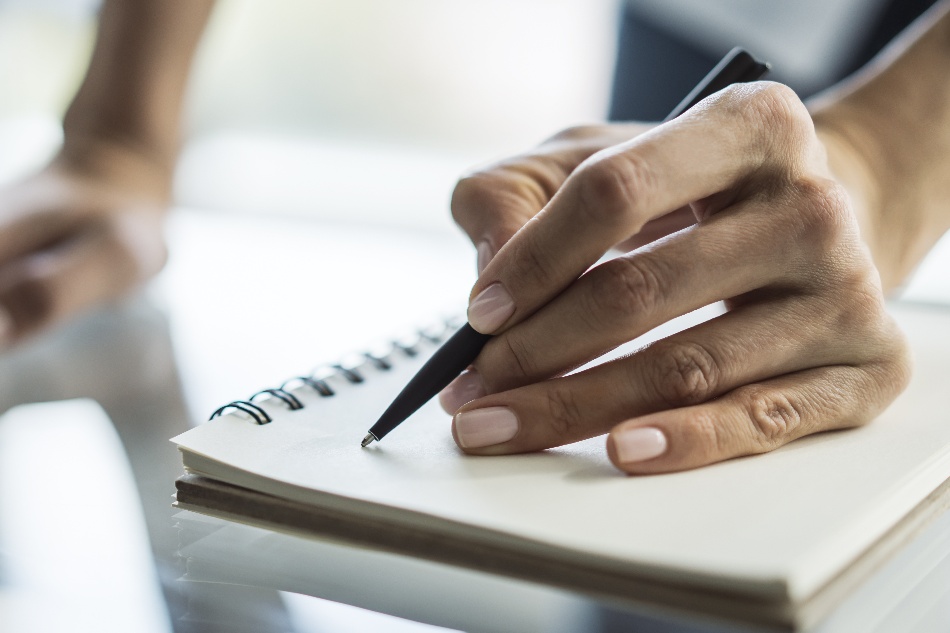
If you’re applying to any higher education program, you’re most likely going to run into something called a “personal statement”. Pharmacy school is no exception, and learning how to write a compelling and unique personal statement is a key part in getting accepted to school. Read on to find out how to write one that stands out!
What is a Personal Statement?
A personal statement serves as a way to highlight your skills, interests and experiences. Personal statements tend to be somewhat autobiographical, but it is not just a lengthy personal essay of your entire life story.
Personal statements are also not a regurgitation of all the information you’ve already included in your application and cover letter. Think of your personal statement as more of a narrative, but still keep it informative.
In writing a personal statement, you’re aiming to give the school or program you’re applying for a snapshot of who you are and why you want to be considered for whatever position. They are as much about how you write as what you write. Schools will receive hundreds of personal statements– make sure yours stands out!
What is the Difference Between a Personal Statement and a Cover Letter?
A cover letter generally serves as a means to sell yourself to a company or school. It introduces your resume and all your relevant school and employment history. A personal statement, however, is meant to be more creative and introduce the school to you as a person in an engaging format.
While an application can come off as just a list of what you’ve done, a personal statement frames all your accomplishments in a way that connects your real-life influences with the dates and degrees on your application.
What is the Best Format for a Personal Statement for Pharmacy School?
Think of your personal statement as a narrative essay outlining how you got to where you are today, as well as where you want to go next. Within this story, relate back to pharmaceuticals and medicine and healthcare fields in an organic way. You’ve chosen this path for a reason, what are the steps that got you here?
What Questions Should I Answer in my Personal Statement?
Some helpful questions to aim to answer throughout your personal statement are:
✅ Why do I want to be a Pharmacist?: Think through the times where you have admired pharmaceuticals or where they have most impacted you. Or, think about when you fell in love with medicine and helped people through pharmaceuticals.
✅ What different pharmaceutical paths would I be interested in pursuing?: Are you interested in nuclear pharmacy? What about private pharmaceutical production? If you have a specific niche in mind for a career path, use this space to talk about your interest.
✅ What makes me an excellent and unique candidate for this program?: Have you taken any specialized courses that make you uniquely qualified for this program? Have you had any outstanding internships or positions within the healthcare world?
✅ What are my strengths?: Where do you excel? What specific strengths could you bring to the program and the team you work with? Use this space to highlight your gifts.
✅ Are there any gaps or inadequacies in my application? How can I explain them here?: If you have anything on your application that may confuse someone not familiar with your life circumstances, try to concisely explain it here. Admissions counselors want to be able to give you the best shot possible at being accepted, and sometimes this requires you being up-front about gaps or missing pieces to your work history.
What Should I Avoid in My Personal Statement?
❌ Don’t just repeat what you’ve said in your application. There’s a place for a more sterile, list-based amalgamation of your achievements, but your personal statement is not this place. Admissions staff will learn a lot more about you if you’re creative with your personal statement.
❌ Don’t steal someone else’s work. Plagiarism will disqualify you from admission to pharmacy programs, and it’s also just bad practice for life in general.
❌ Avoid cliches throughout your writing. It may have been a dark and stormy night when you were born, but that is neither relevant nor original. Find fresh ways to tell your story and engage your readers.
❌ Avoid grammar and spelling mistakes. These can be avoided through several rounds of revision
What Are Admissions Counselors Looking for in a Personal Statement?
What makes a good candidate may vary from program to program, but there are some general things that admissions counselors look for when reviewing personal statements from applicants:
- How have you grown over the years?
- Is your personal statement well-written? Does it show care, consideration and edits?
- Are you up for the challenge of Pharmacy school?
- Do you fit our program?
What Are the Steps to Form a Compelling Personal Statement?
The creative process for a piece like this may vary form applicant to applicant, but the general steps are as follows
1. Brainstorm
This step can be messy, and is generally the most customizable of the process. To start your brainstorming process, think about all the reasons you’re considering pharmacy school and why this program should consider you. This is also a good place to start thinking about what makes you stand out from other candidates, as well as beginning to organize your education and work history.
Since personal statements are more narrative than list-based, start to think about how pharmacists have influenced your life and family. Compelling stories from your own experiences will help admissions counselors see you have a full-bodied connection to the program and career field.
As part of your brainstorming, look at successful personal statements. Websites like Studential and ApplyToUni can give you a good idea of what spelled success for past applicants. Or, if you know anyone who went to pharmacy school already, you can ask them for their best tips.
2. Outline and Draft
How do you make sense of all the information you just brainstormed out? One of the best ways to sort through your thoughts is by looking for natural connections between events in your life. Be sure to highlight the aspects of your career and schooling that will make you stand out the most.
Make sure you’re outlining your statement in a way that makes the most sense for both your story and your reader. Linear outlines with clear progressions through your life story usually work best, but that’s not to say you can’t jump around in the story a bit, especially if pharmacology has played a lot of different roles throughout your life and you’re looking to highlight its effect on you over time.
There are different types of personal statements, generally prompted or unprompted, but they all tend to be between 400-1,000 words long.
Check your personal statement for basic grammatical and spelling mistakes, as well as making sure your tone is both professional and friendly. Make sure your organization makes sense. A good way to ensure this is to have someone else read it and suggest edits. The more sets of eyes you can have on your personal statement, the better chance you’ll have of submitting a flawless piece.
Running your personal statement through a program like Grammarly or Hemingway is another good way to weed out mistakes and make sure your statement is clear.
4. Final Revisions and Submission
Do some final checks of your personal statement. Try to read it as if you’re reading it for the first time, with no context as to your own story. An early start in the writing and drafting process is key for this step, so you can take a few days away from your statement before this final revision if necessary.
If your personal statement was one with a prompt, use this check to be sure you have answered all the questions as fully and uniquely as possible. This is another great place to ask for a second set of eyes to review your statement.
Finally, submit your personal statement with your application to pharmacy school. Be sure that you’ve submitted it before the deadline!
How Do I Close a Personal Statement?
In closing your personal statement, include one last push for yourself and why you’re a good fit for the program. Try to naturally conclude and wrap up all that you’ve said about yourself and your story. Be sure to highlight your interest in the program specifically and give a quick “thank you” for their consideration of your application.
What Now?
Now that you know how to write a great personal statement for pharmacy school, you should narrow down the schools you want to apply to. If you haven’t already, consider NEOMED’s College of Pharmacy ! Our program will prepare you to make an impact on those around you for the better, whether locally or globally. Graduates from our programs boast high NAPLEX test scores, excellent network connections and a deeper understanding of the communities they serve. Apply to NEOMED !
Want to learn more about pharmacy school at NEOMED? Our pharmacy program guide will help you determine if pharmacy school is the right path for you, and how NEOMED can help you begin your future.
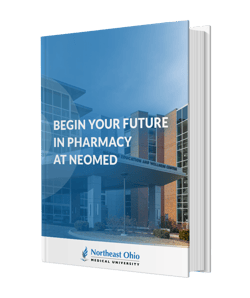
Access our eBook "Begin Your Future in Pharmacy at NEOMED" to learn more about what it takes to become a pharmacist.

About the author
Kelly tomory.
Assistant Director of Admission
More Articles
What do you learn in pharmacy school here are 6 surprising things, how hard is it to get into pharmacy school 3 key application tips, 4 tips for your pharmacy school interview.
Writing the Personal Statement for Pharmacy School: A 5 Step Checklist
You’ve likely written a personal statement at some point in your life. Perhaps while applying to your undergraduate program, some of your schools required you to include an essay describing your achievements, yourself, and what you hope to accomplish in your time at their university. Similarly, many pharmacy programs will require you to write a personal statement for their application.
This, however, is different. You will be able to highlight your relevant accomplishments and address why you want to become a pharmacist to stand out truly . With so many applicants during each cycle, admissions officers use this personal statement to gauge whom they wish to speak with for an in-person interview.
At this phase of the application journey, you've narrowed down the pharmacy schools you’re applying to. Your transcripts are in, letters of recommendation are ready, and it’s time for your pharmacy personal statement. The good news is that, unlike undergraduate applications that sometimes have different prompts, you must answer for various schools; your one pharmacy school personal statement will be sent to every program through your PharmCAS application . That also leaves an exciting challenge: Even if you have a favorite, you must consider how you want to write this personal statement, as it shouldn’t be tailored toward one specific school.
1) Determining the Narrative
When writing a pharmacy school personal statement, the most common pitfall students experience is the need for more effort placed into their writing. While your grades may be exceptional, and your letters of recommendation prove that your student-teacher relationships are healthy and you are a pleasure to have in class, having a generic pharmacy personal statement doesn’t differentiate you from other qualified applicants. If all applicants have already covered the first two things, the personal statement may be the shining piece of the application. For most students, writing this statement will be the most challenging part of the application process.
Begin to formulate your narrative. Lay out the structure and the different sections. There’s no specific format that pharmacy schools are looking for, so make this personal statement unique to yourself. As mentioned, the “cookie cutter” approach to this part of the application is where most students stumble. Use your time wisely and start early . Additionally, you can easily find a sample personal statement on various websites to help structure your thoughts. However, remember that these should be used only as samples and that you shouldn’t rely on them to format your statement.
2)Crafting a Unique Story
Each pharmacy school program wants students who demonstrate tenacity, which will help them succeed in their respective programs. One way to approach writing your pharmacy school personal statement is from the point of view of the admissions committee. Anyone charged with reading thousands of applications will focus on specific questions that signal a level of quality about the rest of the personal statement.
First, what's the reason that this student is choosing pharmacy as their career? Are they doing this for income or a genuine interest in providing the best care for patients? Does the applicant demonstrate a thoughtful understanding of their strengths and weaknesses? Do their ideals align with the mission statement of the school of pharmacy? Each reviewer may concentrate on different questions, but they want to see you feel a personal drive for a career as a pharmacist . Place yourself into the seat of an application reviewer and formulate different questions you could ask students. Try answering these questions and see how genuine your answers are. How you answer may decide if you want to continue to pursue this pharmacy school path.
3) Focus on Your Opening
One universal method many writing courses teach you is always to have a solid opening statement. I'd like you to please use this as an opportunity, to begin with a personal story about why you decided that pharmacy is the right career for you or maybe an inspiring quote that has always resonated with you. The reviewer may have reviewed several applications, so your first few sentences should stand out. You want to be able to make an impression from the beginning while showing an earnest drive to spend a career as a pharmacist.
Once you’ve effectively engaged the reviewer, it’s time for the “meat” of the personal statement. What do pharmacy application committees genuinely want to hear?
4) Getting to Know You
They want to learn more about you before meeting in a live interview. Tell your own story succinctly but without cutting corners. Briefly describe how you learned to overcome obstacles like that to better yourself and those around you. Sure, you can write about your most relevant academic accomplishments. But go beyond that.
Discuss how certain clubs and organizations have helped you progress through your undergraduate experience and how those organizations may have led you to pursue the path of pharmacy school. Highlight the leadership positions you may have held in college that have helped mold you into the leader you see yourself as today. After setting those up, discuss the skills you’ve acquired to help you in pharmacy school and how they’d make you a better pharmacist.
When you mention your relevant academic studies, please keep repeating the pharmacy college admission test (PCAT) scores or the 4.0 GPA you achieved. The committee has this information before them as they read; they don’t need to be reminded.
Talk in detail about your relevant work experiences, such as research or a part-time job in a pharmacy. Discuss how these different work experiences furthered your commitment to the profession. Identify what aspects of the pharmacy setting may have attracted you and what you have learned from these experiences. Some students come into this part of the application process without work experience. That’s okay. You can highlight any volunteer work related to healthcare or pharmacy.
5) Close with Confidence
Finally—and we can’t stress this enough—keep your writing professional. You’re making an impression on a professional committee, and as much as you want to make your statement sound lighthearted, remember that the reviewers’ time is at a premium for reviewing the essays and interviews in the next round.
Be succinct, direct, and human.
Remember to keep our advice top of mind:
The goal of your personal statement is to showcase why you would be the ideal pharmacy student and why your traits/qualities reflect those of a pharmacist.
Be as authentic as possible when detailing why you want to be part of the PharmD program.
GPA and PCAT scores can only get you so far. Your personal statement is a chance for you to stand out in front of the other applicants who apply to the same pharmacy program as you.
Remember, perfecting the personal statement takes time and your admission may depend on how much effort you ultimately put into your writing.
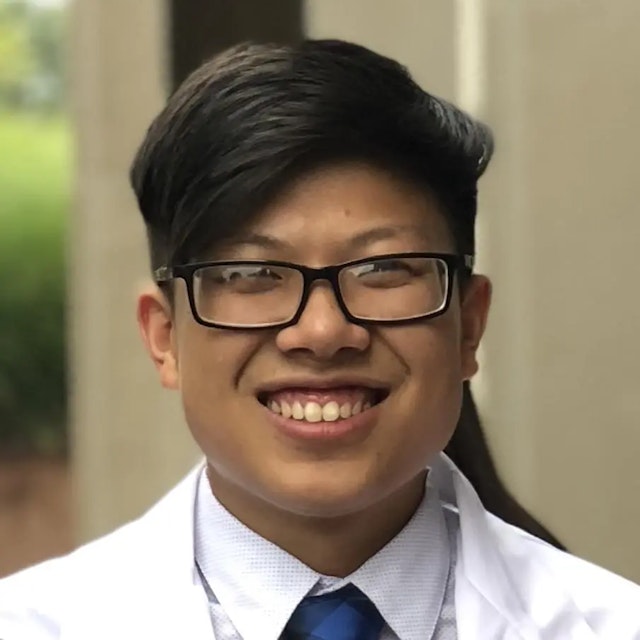
Hong Chen, PharmD
My name is Hong Kui Chen and I am a graduate of The Ohio State University Pharmacy Class of 2022. I am currently working as a clinical research associate at Medpace, Inc, a contract research organization based in Cincinnati, Ohio. My work mainly consists of traveling to various sites around the country and providing protocol training on new clinical trials or monitoring data. While I enjoyed the traditional pharmacy role of working in retail or hospital, I wanted to expand and pursue this non-traditional role to see how clinical trials operate. I have a passion for being able to impact patients in a grand scale and even though I don’t have the 1-on-1 patient interaction, the work that I do can have long lasting contributions to overall patient health.
Opinions and information published by the author here on PharmDDegree.com are of my own and do not necessarily represent the views or opinions of my employer.
Do Not Sell My Info
- Applying to Uni
- Apprenticeships
- Health & Relationships
- Money & Finance
Personal Statements
- Postgraduate
- U.S Universities
University Interviews
- Vocational Qualifications
- Accommodation
- Budgeting, Money & Finance
- Health & Relationships
- Jobs & Careers
- Socialising
Studying Abroad
- Studying & Revision
- Technology
- University & College Admissions
Guide to GCSE Results Day
Finding a job after school or college
Retaking GCSEs
In this section
Choosing GCSE Subjects
Post-GCSE Options
GCSE Work Experience
GCSE Revision Tips
Why take an Apprenticeship?
Applying for an Apprenticeship
Apprenticeships Interviews
Apprenticeship Wage
Engineering Apprenticeships
What is an Apprenticeship?
Choosing an Apprenticeship
Real Life Apprentices
Degree Apprenticeships
Higher Apprenticeships
A Level Results Day 2024
AS Levels 2024
Clearing Guide 2024
Applying to University
SQA Results Day Guide 2024
BTEC Results Day Guide
Vocational Qualifications Guide
Sixth Form or College
International Baccalaureate
Post 18 options
Finding a Job
Should I take a Gap Year?
Travel Planning
Volunteering
Gap Year Blogs
Applying to Oxbridge
Applying to US Universities
Choosing a Degree
Choosing a University or College
Personal Statement Editing and Review Service
Clearing Guide
Guide to Freshers' Week
Student Guides
Student Cooking
Student Blogs
- Top Rated Personal Statements
Personal Statement Examples
Writing Your Personal Statement
- Postgraduate Personal Statements
- International Student Personal Statements
- Gap Year Personal Statements
Personal Statement Length Checker
Personal Statement Examples By University
- Personal Statement Changes 2025
- Personal Statement Template
Job Interviews
Types of Postgraduate Course
Writing a Postgraduate Personal Statement
Postgraduate Funding
Postgraduate Study
Internships
Choosing A College
Ivy League Universities
Common App Essay Examples
Universal College Application Guide
How To Write A College Admissions Essay
College Rankings
Admissions Tests
Fees & Funding
Scholarships
Budgeting For College
Online Degree
Platinum Express Editing and Review Service
Gold Editing and Review Service
Silver Express Editing and Review Service
UCAS Personal Statement Editing and Review Service
Oxbridge Personal Statement Editing and Review Service
Postgraduate Personal Statement Editing and Review Service
You are here
- Mature Student Personal Statements
- Personal Statements By University
- Accountancy and Finance Personal Statements
- Actuarial Science Personal Statements
- American Studies Personal Statements
- Anthropology Personal Statements
- Archaeology Personal Statements
- Architecture Personal Statements
- Art and Design Personal Statements
- Biochemistry Personal Statements
- Bioengineering Personal Statements
- Biology Personal Statements
- Biomedical Science Personal Statements
- Biotechnology Personal Statements
- Business Management Personal Statement Examples
- Business Personal Statements
- Catering and Food Personal Statements
- Chemistry Personal Statements
- Classics Personal Statements
- Computer Science Personal Statements
- Computing and IT Personal Statements
- Criminology Personal Statements
- Dance Personal Statements
- Dentistry Personal Statements
- Design Personal Statements
- Dietetics Personal Statements
- Drama Personal Statements
- Economics Personal Statement Examples
- Education Personal Statements
- Engineering Personal Statement Examples
- English Personal Statements
- Environment Personal Statements
- Environmental Science Personal Statements
- Event Management Personal Statements
- Fashion Personal Statements
- Film Personal Statements
- Finance Personal Statements
- Forensic Science Personal Statements
- Geography Personal Statements
- Geology Personal Statements
- Health Sciences Personal Statements
- History Personal Statements
- History of Art Personal Statements
- Hotel Management Personal Statements
- International Relations Personal Statements
- International Studies Personal Statements
- Islamic Studies Personal Statements
- Japanese Studies Personal Statements
- Journalism Personal Statements
- Land Economy Personal Statements
- Languages Personal Statements
- Law Personal Statement Examples
- Linguistics Personal Statements
- Management Personal Statements
- Marketing Personal Statements
- Mathematics Personal Statements
- Media Personal Statements
- Medicine Personal Statement Examples
- Midwifery Personal Statements
- Music Personal Statements
- Music Technology Personal Statements
- Natural Sciences Personal Statements
- Neuroscience Personal Statements
- Nursing Personal Statements
- Occupational Therapy Personal Statements
- Osteopathy Personal Statements
- Oxbridge Personal Statements
- Pharmacy Personal Statements
- Philosophy Personal Statements
- Photography Personal Statements
- Physics Personal Statements
- Physiology Personal Statements
- Physiotherapy Personal Statements
- Politics Personal Statements
- Psychology Personal Statement Examples
- Radiography Personal Statements
- Religious Studies Personal Statements
- Social Work Personal Statements
- Sociology Personal Statements
- Sports & Leisure Personal Statements
- Sports Science Personal Statements
- Surveying Personal Statements
- Teacher Training Personal Statements
- Theology Personal Statements
- Travel and Tourism Personal Statements
- Urban Planning Personal Statements
- Veterinary Science Personal Statements
- Zoology Personal Statements
- Personal Statement Editing Service
- Personal Statement Writing Guide
- Submit Your Personal Statement
- Personal Statement Questions 2025
Pharmacy Personal Statement Examples
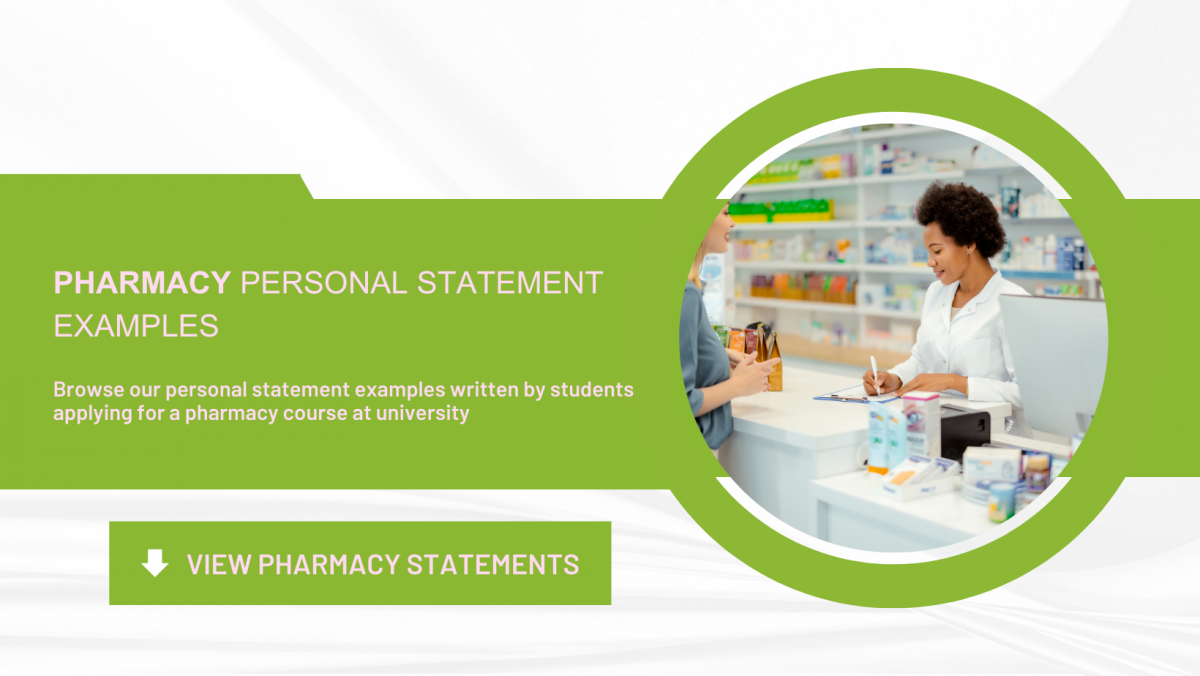
What is a pharmacy personal statement?
Writing a personal statement for pharmacy is a chance to sell yourself to the admissions tutors and show them why you would make a great phramacy candidate.
It’s a place to describe your skills and strengths, as well as your career plans.
You are allowed up to 4,000 characters to explain why you are applying for a pharmacy degree, so you need to make sure your statement is as polished as possible to stand out from the crowd.
How do I write a good pharmacy personal statement?
Good pharmacy personal statements always use evidence to support their claims. You need to convince admissions tutors that you’re a good match for the programme, so if you claim to be committed or inquisitive, then use examples from your life to back it up.
To write a great pharmacy personal statement you need to start early, brainstorm some ideas, and then begin your first draft.
This will then need to be carefully revised and edited before asking family and friends for feedback. Incorporate their comments and suggestions, and see how it is improved before asking them to look at it again.
Read through our pharmacy personal statement examples to give you an idea of what a good pharmacy statement looks like.
Make sure you proofread your statement for grammar and spelling before sending it off, and if you feel you need a little extra help, take a look at our personal statement editing services .
What should I include in my pharmacy personal statement?
Many students choose to start their statement by picking a specific aspect of pharmacy and explaining why they enjoy it, e.g. drug chemistry, cardiovascular and renal systems, etc.
Admissions tutors want candidates that are as passionate about the subject as they are.
As well as your motivations for studying pharmacy, think about your hobbies and extracurricular activities too. What skills have you learned from these and how will these help you in your pharmacy degree?
Talk about any work experience placements you have completed, e.g. shadowing a doctor or nurse, or someone in a similar medical/clinical profession. What did you take away from this experience? Do you feel you have all the necessary personal traits and qualities that make a good pharmacy student?
Your wider reading is also important, so it's worth mentioning anything you've read recently that you found interesting and why. Generally, admissions tutors like students who express their views and opinions, and can back them up with evidence.
For more help and advice on what to write in your pharmacy personal statement, please see:
- Personal Statement Editing Services
- Personal Statement Tips From A Teacher
- Analysis Of A Personal Statement
- The 15th January UCAS Deadline: 4 Ways To Avoid Missing It
- Personal Statement FAQs
- Personal Statement Timeline
- 10 Top Personal Statement Writing Tips
- What To Do If You Miss The 15th January UCAS Deadline.

What can I do with a pharmacy degree?
There are many different career options open to those wishing to study pharmacy at university. These include:
Jobs directly related to your degree include:
- Community pharmacist
- Hospital pharmacist
- Research scientist
Jobs where your degree would be useful include:
- Clinical research associate
- Higher education lecturer
- Medical sales representative
- Medical science liaison
- Pharmacologist
- Product/process development scientist
- Regulatory affairs officer
- Research scientist (life sciences)
- Science writer
- Toxicologist
For more information about careers with a pharamcy degree, please see Prospects and the National Careers Service .
What are the best UK universities for pharmacy?
Currently, the best universities in the UK for studying pharmacy and pharmacology are:
For more information about pharamacology university rankings in the UK, please see The Complete University Guide and SI UK .
Related resources
A level results day.

Find out more

Replying To UCAS Offers

Waiting For University Offers

How To Apply To University

8 Personal Statement Mistakes To Avoid

7 University Interview Mistakes

Uni Open Day Tips


Writing a Personal Statement for Pharmacy School (10 Tips)
They say, “The art of medicine consists of amusing the patient while nature cures the disease.”
The medicine business will never run out of demand and thus, being a pharmacist is undoubtedly a promising career. If you choose to be a pharmacist and want to get into a good pharmacy school, you need to write a personal statement. It is usually a part of the college’s admission requirements. Not sure how to write a personal statement for pharmacy school? Hey, I’m here to help.
Why is a personal statement important?
Statistics have revealed that the rejection rate of pharmacy schools is as high as 50%. No, they’re not denied because of lower grades. These students’ scores are as good as the other applicants. The differentiating factor is none other than the personal statement. The admission committee welcomes dedicated students who are passionate about the profession. An outstanding personal statement may give that lasting good impression that they are looking for. Now, let me share a few tips to get you started.
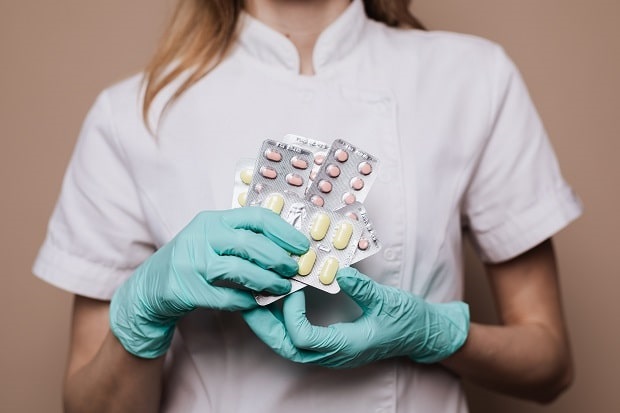
10 Tips on Writing a Good Personal Statement for Pharmacy School:
1. start early.
An amazing pharmacy school personal statement needs a bit of preparation . You do not want to rush it and create a mediocre one, do you? Once you’ve decided which schools you want to apply to, take the time and start planning early about what to write . I’d say it takes at least a month of serious thoughts and several drafts before you can pen down a good one!
2. Introduce Yourself Properly
Start the personal statement with a catchy line to grab the reader’s attention . Once you’ve hooked them to read further, switch to describing yourself next. You must connect with the reader, even if it requires sharing a few personal anecdotes. The aim is to communicate who you are as a person. Think of it as a written monologue you submit to the admission committee. The more the readers connect with you on a personal level, the better the chances they’ll like you and eventually accept you.

Always be genuine when introducing yourself. Let your real personality shine.
3. Have a Proper Structure and Organize Your Essay Well
Ensure your personal statement essay has an appropriate structure. As I mentioned above, you must start with a catchy sentence to grab the recipient’s attention. This will keep them intrigued to read more. Once you have a proper “first statement” follow it up with smaller paragraphs. Try to keep your essay theme-based. Talk about every topic distinctively and move from one topic to another seamlessly. Also, you must have a strong conclusion that would summarize the entire personal statement. Try to stay away from controversial or highly debatable topics and make your essay as reader-friendly as possible.
4. Show Your Enthusiasm and Commitment
Unless you’re passionate about pursuing a career that involves legally preparing and dispensing drugs, you should not apply for admission to a pharmacy school. Your lack of interest would reflect in your essay if you are just applying for the sake of getting into college. Trust me, pharmacy school and the subsequent post-graduate courses you’d attend are no joke! You do not want to be unhappy in the future for choosing this profession halfheartedly. So, once you’re committed to writing your statement, show your enthusiasm through your words. Don’t overdo it, though. There’s a long road of struggle ahead and the admission committee must understand that you’re committed to winning the battle!

Your enthusiasm and commitment to the course must be reflected in your statement.
5. Do Not Add Fillers
Fillers are nothing but including unnecessary information in your writing. Simply put, it is “beating around the bush”. Please do not do it. In any form of writing, including fluff words is inessential, and it is uncalled for. Research pharmacy topics and trends and come prepared to write a personal statement . Stick to the point and do not add irrelevant content just to meet a certain word limit or make your essay seem longer. The admission committee will most likely lose interest in your essay if you do so. Put your focus on writing clear and concise content.
6. Include Academic Successes that are Pharmacy-related
Talking about achievements unrelated to the course will not help you earn brownie points. Why would winning an art contest or achieving top grades in mythology interest the admission committee? On the flip side, are there any distinctive academic successes that connect your aptitude for science or your passion for enrolling in a pharmacy school ? Be sure to include that. Try to show how you are suited for this profession. However, do not force-fit anything by talking about unrelated achievements.
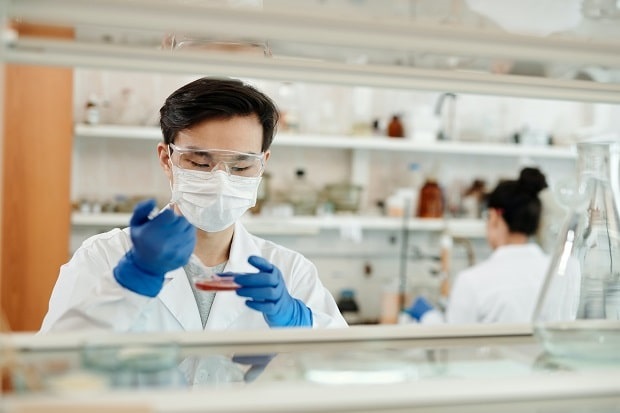
If you excel in science subjects in high school, particularly those that involve laboratory experiments, include this in your statement.
7. Ensure the Grammar and Punctuation are error-free
Always proofread your work. Even if that means reading it 5 times in a row. There is always room for improvement, you know. Ask for feedback and work on the content and structure of your statement if needed. You could leverage online writing add-ons or apps such as Grammarly or ProWritingAid to check your grammar and punctuation. The admission committee can spot even tiny mistakes easily, and you wouldn’t want to make one, right? Here’s a pro tip. Ask your English professor or teacher to read through your essay once. Who can check your work better than them? Incorporate changes as necessary.
8. Say No to Plagiarism
Plagiarism or copying others’ work is your expressway toward rejection. Not only does it affect your credibility in the field, but plagiarism is also a punishable offense . There are multiple apps and tools to detect plagiarized content, so do not even think of it. Yes, you can research and look through similar examples for ideas on the content and structure. However, always write your pharmacy school personal statement in an original format and your own words. If you must copy an idea from some published sources, make sure that you paraphrase the sentences and paragraphs well.

9. Get a Second Opinion
I mentioned earlier about connecting with your English professor or asking others for feedback on your content. I want to put it out here once again, that you must connect with your friends or family who may or may not have pharma experience, to check your work. Their unique perspective can offer guidance to help you improve your content. Take any constructive feedback with a positive attitude and work on bettering your final copy.
10. Display Confidence
It requires immense sincerity and self-reflection to write a pharmacy school personal statement. For your readers, to relate better to your essay, you must also consider their point of view. Your statement should exude confidence. Include selling points and market your brand by providing pieces of evidence or cases. For example, if you want to mention that you have exemplary communication skills, tell them how and authenticate your content.
Final Thoughts
A pharmacist’s job requires hard work, dedication, and utmost passion. If this is your calling, jump at the opportunity of applying to top pharma schools. Keep these tips in mind while writing your pharmacy school personal statement. Did I miss anything above that may have worked for you? Next up, you may want to explore a guide to the best marketable skills you can learn today .

Get your free PDF report: Download your guide to 80+ AI marketing tools and learn how to thrive as a marketer in the digital era.

Rafal Reyzer
Hey there, welcome to my blog! I'm a full-time entrepreneur building two companies, a digital marketer, and a content creator with 10+ years of experience. I started RafalReyzer.com to provide you with great tools and strategies you can use to become a proficient digital marketer and achieve freedom through online creativity. My site is a one-stop shop for digital marketers, and content enthusiasts who want to be independent, earn more money, and create beautiful things. Explore my journey here , and don't miss out on my AI Marketing Mastery online course.
- Advertise With Us

- Pharmaceutical Technology
- Clinical Pharmacy
- Pharmaceutical Microbiology
- Pharmacology
- Pharmaceutics
- Pharmacy Management
- Pharma Companies
- Pharmaceutical Machines
- Questions and Answers
- PHARMA MARKETPLACE
- Pharma Marketplace
Tips for Writing a Pharmacy School Personal Statement
Like in any other field of education, a pharmacy statement is a way of selling yourself to the admission tutors by showing them why you are a great pharmacy candidate. A personal statement is an opportunity to detail your skills, strengths, and career objectives in pharmacy. A personal pharmacy statement allows you a maximum of 4000 characters. It would be best to discuss why you are interested in pursuing a pharmacy degree in as few words as possible while ensuring you stand out from the crowd of prospective students.
- 1 Why is a personal statement important?
- 2 What makes a good personal statement?
- 3 Common mistakes to avoid
- 4 What to include in your statement
- 5.1 1. Preparation
- 5.2 2. Proper grammar
- 5.3 3. Proper structure
- 5.4 4. Connect with your reader
- 5.5 5. Include only Pharmacy relevant achievements
- 5.6 6. Avoid plagiarism
- 5.7 7. Avoid controversial topics
- 5.8 8. Proofread your work
Why is a personal statement important?
Statistics show that at least 50% of pharmacy school applications get rejected. These applications are not always denied because of poor scores. These students typically have scored just as good as their accepted counterparts. A personal statement is essential because it is what makes or breaks your application. This is because admission tutors are keen to welcome candidates who are genuinely passionate about and dedicated to the profession.
What makes a good personal statement?
An excellent personal statement uses evidence. Support all your claims. It would be best if you remembered that the admission tutors already know you are trying to convince them that you are a suitable match, as are all the contenders. Sure, you can go on and on about how willing you are to learn, but it would be more effective if you backed such claims with real-life examples.
Please use a personal statement writer service to get professional custom help in writing a good pharmacy personal statement. As a matter of fact, CustomWritings is considered to be one of the most reliable services on the market currently.
Common mistakes to avoid
It is important to remember that the perfect pharmacy personal statement does not have to follow a specific format. Remember that the admission tutors will only review your pharmacy statement for 10-30 minutes, no matter how much time you spend on it. This is not to say that you should rush through it but focus on capturing and maintaining the tutors’ interests. The tutors will review your statement from different angles, meaning you cannot afford to leave room for misinterpretation.
Please resist the urge to follow a predetermined formula you acquired online or from your friends, regardless of how they scored on it. You may easily be tempted to borrow ideas from successful pharmacy students, but this will compromise your authenticity. The admissions tutors have likely seen numerous personal statements so do not embarrass yourself by submitting a copied statement. Besides, you want to show how passionate you are about pharmacy, don’t you?
Read Also: How to Become a Chemistry Problem Solver
What to include in your statement
- Pick a specific pharmacy area you are most interested in and explain why you are interested in that area. Show that you are passionate about that subject (it helps if you are passionate about the area you choose to write about).
- Highlight your motivations for studying pharmacy. When did you realize you wanted to pursue pharmacy? Why? Are you able to support this with evidence from your life?
- Describe your hobbies and extracurricular activities (especially if they are related to pharmacy). The goal is to highlight the skills you have gained from these activities and how they will benefit you in your studies as a pharmacist.
- Include any work experience placements in related fields such as nursing or medicine. Talk about what you learned from these experiences.
- Talk about your traits and qualities that you feel make you a good pharmacy student.
- Please demonstrate that you are a good reader by talking about recent related reads and how they have shaped your thinking. Feel free to respectfully share any views and opinions, always remembering to support them with solid evidence.
How to Write a Good Pharmacy School Personal Statement
Below are a few tips to make sure your statement makes your application stand out and increase your chances of getting accepted into your program of choice:
1. Preparation
Preparation is key. Start early so that you do not end up rushing and producing a mediocre statement. Start planning early as you don’t want to be pressed for time.
2. Proper grammar
Use proper grammar and punctuation. Poor grammar makes for a wrong first impression. Polish your basics on grammar and avoid submitting a statement riddled with error.
3. Proper structure
Structure your statement correctly. Ensure the first statement captures your reader’s attention and then has a few supporting paragraphs. You have a tiny window of grabbing your reader’s attention, so use it wisely. Finally, have a conclusion that ties it all together.
4. Connect with your reader
Connect with your reader, even if it means sharing a few personal stories. The goal here is to make sure you communicate who you are. A personal statement is a monologue to the admission committee, and if they can connect with you, they will like you.
Show the admission tutors that you are aware of the challenges that await you and that you are committed regardless. Talk about how rewarding you think this path will be for you, your family, your community, your patients, and the pharmacy practice itself.
5. Include only Pharmacy relevant achievements
If you have lofty achievements outside the pharmaceutical field, do not include them in your statement. Include only pharmacy-related experiences.
6. Avoid plagiarism
Committee members can always see through plagiarized works, so avoid this at all costs. This will only destroy your credibility in the field.
7. Avoid controversial topics
The personal statement is not a discussion ground for questionable topics. Do not alleviate issues that disagree with the overall subject in question.
8. Proofread your work
Sometimes people miss tiny mistakes by not proofreading their work. Have friends and family check your work and act on the comments. Inadequate proofreading can be catastrophic, so ensure you correctly use your language before sending the statement to the admission committee.
As now you are well acquainted with the components of writing an impeccable pharmacy personal statement , you should have no trouble in getting admitted into Pharmacy school. Pharmacy school is about honor and prestige, and you need the best of luck in this noble endeavor.
Chemistry Problem Solver: How to Become One?
Understanding the Various Types of Hepatitis Virus
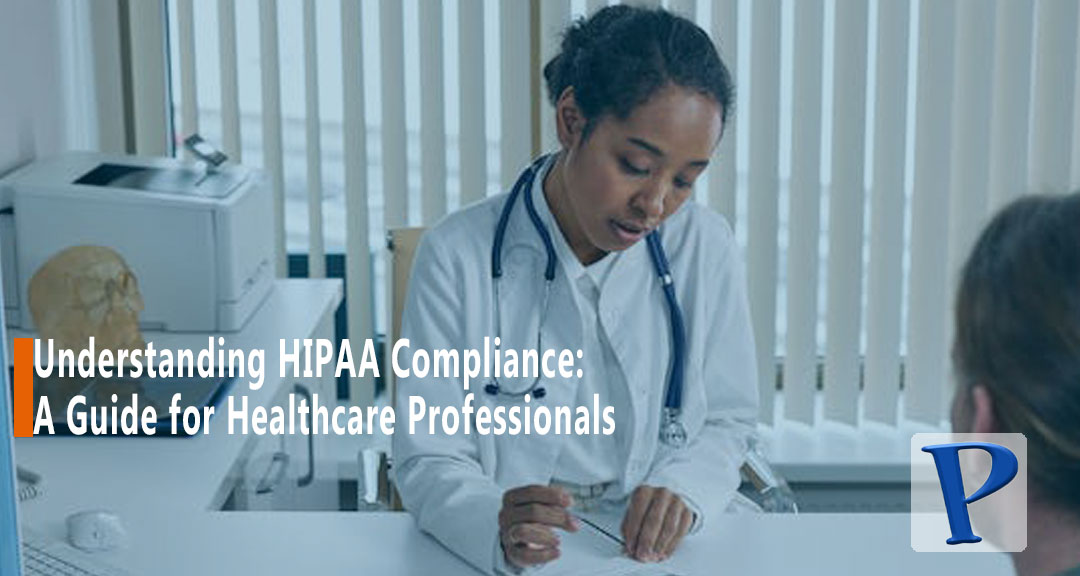
September 26, 2024

September 23, 2024
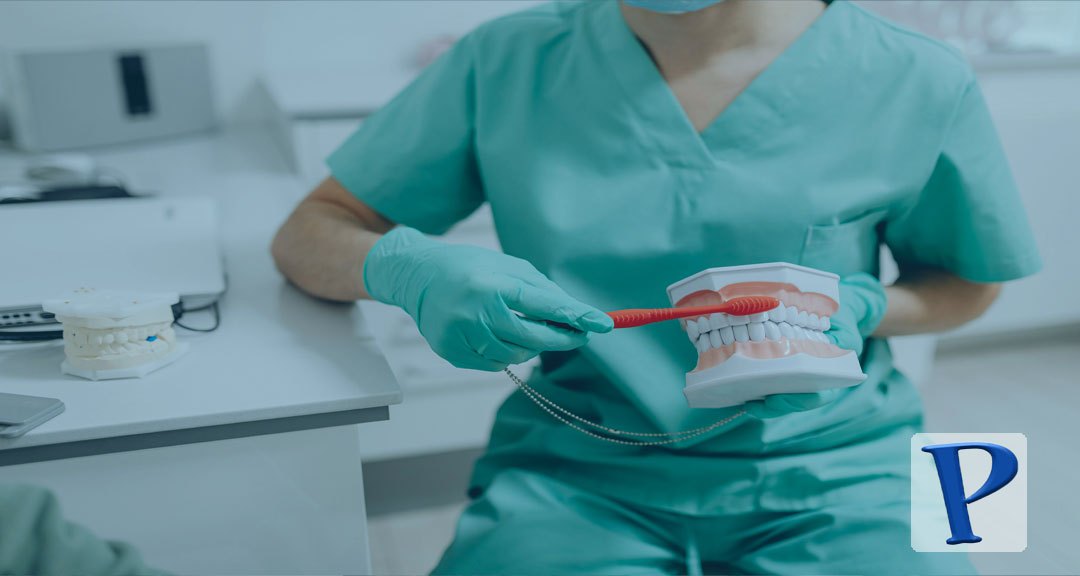
September 20, 2024
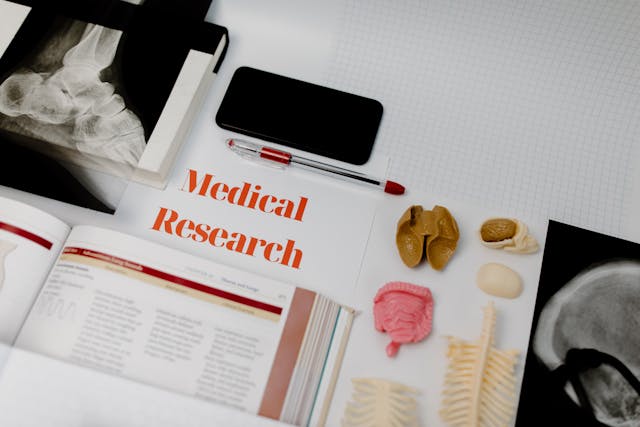
September 5, 2024
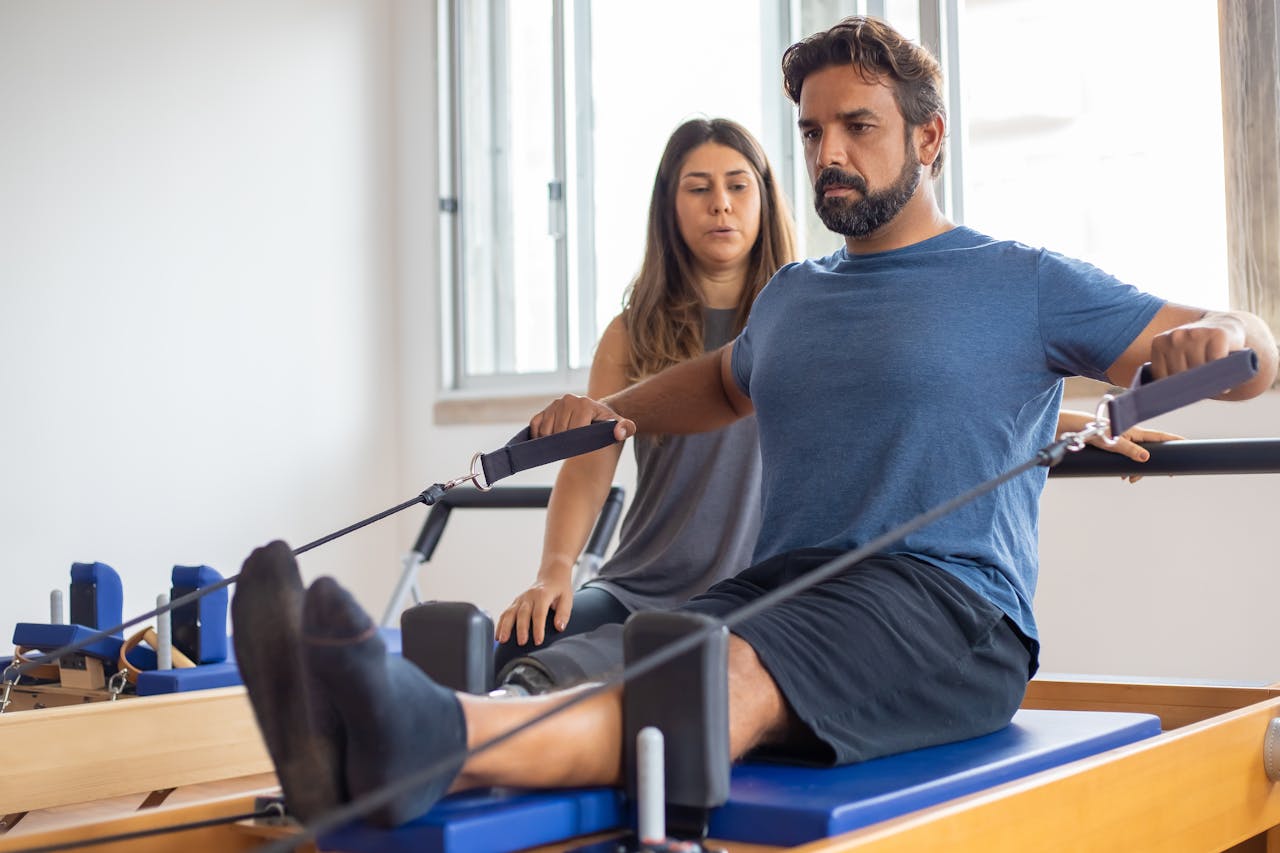
September 4, 2024

Thanks for Sharing the Great Post.
You are welcome. I am happy you found it useful.
I’m very excited to have found out this article, Keep on writing more and more. All Assignments Help
I love dis article
Leave a Reply Cancel reply
Your email address will not be published. Required fields are marked *
- Why Do the Effects of Drugs Vary Between Different People?
- There Is No Favorable Policy for the Drug Manufacturers in Nigeria – Dr. Sabiu Adamu
- NAFDAC State Offices and Contact Details
- Effervescent Salts
- How long does it take for Claritin to take effect?
- 5 Things to Understand About Syncope and Treatment Options
- What is pharmacodynamics in pharmacology?
- General Considerations During Pilot Plant Scale-up
- Outsourcing Your Healthcare Business the Right Way
Regulations, Guidelines and Clinical Trials
Important links, submit articles.
- Terms and Conditions
- Privacy Policy

COMMENTS
Tips for Writing Your Pharmacy Personal Statement: Tip #1: Be authentic. The personal statement should explain why you want to study pharmacy, so your discussion of this should be true to your experiences.
Pharmacy school is no exception, and learning how to write a compelling and unique personal statement is a key part in getting accepted to school. Read on to find out how to write one that stands out!
The goal of your personal statement is to showcase why you would be the ideal pharmacy student and why your traits/qualities reflect those of a pharmacist. Be as authentic as possible when detailing why you want to be part of the PharmD program.
Our pharmacy personal statement examples for university should inspire you to write your own unique statement, and help you understand how students have successfully applied for a pharmacy degree in the past.
Do you need ideas on how to effectively write a personal statement for pharmacy school? Check out our helpful tips.
Like in any other field of education, a pharmacy statement is a way of selling yourself to the admission tutors by showing them why you are a great pharmacy candidate. A personal statement is an opportunity to detail your skills, strengths, and career objectives in pharmacy.